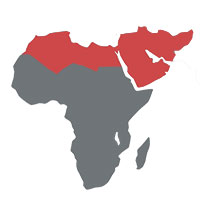Climate Refugees: Coming Soon from an Island Near You!
Yara Al-Wazir | June 20, 2011.
As a refugee, no matter how many countries I visit or live in, I never feel like I’m at home. I was born in Kuwait in 1992 to Palestinian refugees. Although my parents come from different parts of Palestine, including Haifa and Gaza, their love for the country is undeniable. Many people argue that divorce, trauma, or poor education are the factors that crush a human being. I can assure you that is false. The worst thing one can go through, as a child or as an adult, is not having a home and having a refugee label instead.
The truth is that no one should have to go through what I’m going through now. Not now, not ever. The UNHCR estimates that there are currently 15 million refugees. Sadly, we are looking at a new generation of refugees: climate refugees. The American Association for the Advancement of Science predicts there will be 50 million climate refugees by 2020.
Knowing first and foremost what being a refugee feels like, I feel responsible for every single negative thing that will happen to them in their future, and in the future of their children. It is simply not fair that those who cause the least damage suffer the most. There is no way that our actions and irresponsible thinking which lead to this situation can be justified.
There’s a dichotomy between climate refugees and political refugees; the situation in Palestine which drove my grandparents out of their country was a war instigated by infinite wants and finite resources: the Israeli government continued to occupy Palestinian villages, breaking their own words and the borders which were agreed upon in 1978. Unfortunately the mindset of “not enough” is still employed to this day in our consumerist society. By contrast, the issue of climate refugees is an interesting mix of over dependence of fossil fuels, mixed with a little of the industrial revolution and the natural expanding of the universe. However, there’s no denying that both situations could have been stopped by strong, serious international intervention, saving millions of lives.
Climate refugees have already begun fleeing their countries. The good news is that we have the chance to curb this situation. By addressing this international issue today, we can change the situation tomorrow.
The solutions for avoiding stripping thousands of people from their countries and their identities mirror the solutions for the global financial crisis: higher efficiency, smarter energy sources, less waste and more thought in design, manufacture, and implementation would not only stimulate the economy by creating thousands jobs, but it would also help our environment greatly These hefty investments would ensure a more sustainable future for our children, and curb the number of climate refugees. Who knows, we could even prove the UN wrong.
I’m not attempting to reverse the current situation of climate refugees because I want to avoid overpopulation, overfishing, the devastating effects the issue would have on the global economy, or the strain it would put on the Earth’s resources – I want to stop this because there is no reason that any person in this world deserves to go through what I go through every single day. There is no reason that a person should have to hear about how unbelievably beautiful their land is, read poetry about how it smells, its beauty, and pure well-rounded general awesomeness, and not be able to see it with their own eyes, not be able to feel it with their own touch, and not be able to eat their countries’ olive trees.
I started The Green Initiative over two years ago with a solid mission: to raise awareness about climate change through art. For the past two years, people have been asking me the golden question: why? I spent the majority of my formative years in an oil-rich nation where petrol is cheaper than water. Climate literacy is virtually non-existent, and despite being one of the nation’s most exposed to sun-light, not a single solar-powered electricity station exists. Apathy about the situation is widespread. Why wouldn’t it be? There’s no such thing as seasonal fruits in Kuwait, everything is imported and so we don’t even feel the seasons go by. My answer to the golden question would often be a joke about how I want to find a solid job once I graduate with my Chemical Engineering and Environmental Protection degree, or that I’d like to be able to discuss climate change politics more frequently, but deep down I always knew that the reason I wanted to transform apathy into action was to protect future generations from feeling what the Palestinian refugees, and all refugees in general feel today: lost.
The power of the people and self incineration has been proven by Bouzizi of Tunisia, who by sparking a match-stick on his clothes sparked revolutions across the Middle Eastern region. It’s time for people to stop waiting around for governments to take action, and to take action into their own hands.
I’m not asking you to set yourself on fire. In fact, please don’t; combustion releases a lot of CO2 into the atmosphere, which is a greenhouse gas and therefore would render this article counter-productive. Instead, I want you to stand up and admit that there are enough wars in this world displacing people, enough people killing people, and enough fear and threat of death being bread within our communities for us to displace even more human beings with our war on nature. We’re dying at the cost of our own pollution and we need to change that. Sustainable living and green-thinking is no longer an action that changes your life; it’s an action that saves lives.
We have to carry each other now. Affirm life.











comment